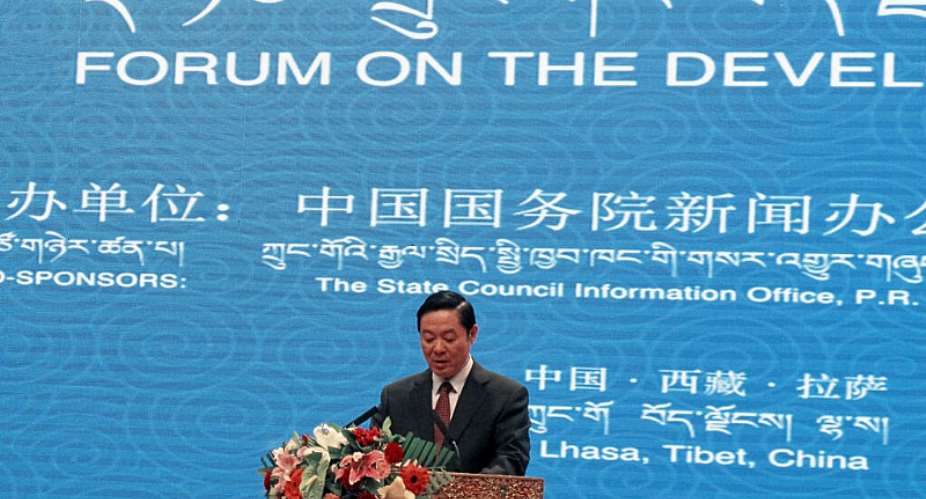Much of Western criticism of China focuses on the vast collection of "re-education" centers in Xinjiang. Predominantly focused on Muslim minorities, these centres have resulted in the incarceration of thousands of Uyghurs who are forced to study Chinese language and culture. The system, however, was first tested in Tibet.
"There is no hope for our new generations. They are shifting to Chinese-only education," Dr Gyal Lo, a sociologist and specialist in education policy in Tibet, told RFI. "It will have a long-term effect."
Chinese Communist Party (CCP) leader Xi Jinping prioritised Mandarin language education for China's "official minorities" – Tibetans, Uyghurs, Mongols, Manchus – first at the 2014 Central Ethnic Work Conference.
As part of this policy, Beijing aggressively altered language education in minority areas like Xinjiang and Tibet.
In practice, this meant that education for Tibetan children was controlled by the directives of the central government.
"The society is systematically being controlled," says Gyal Lo, who in a recent publication in the Tibet Review describes China's handling of Tibet as "colonial."
'Colonial' rule
In his article, Gyal Lo describes the "seven stages of colonialism," a theory first applied to the colonisation of indigenous people in Canada.
Among the stages outlined in the article are:
- occupation
- social destruction
- external political control
- economic dependence
- social stratification.
He compares it to the way the CCP and its army, the People's Liberation Army, occupied Tibet in 1949, after which the administration of the country was handed over to Beijing's representatives.
Gyal Lo adds that the idea that China should be considered a colonial power "has not yet been fully recognised by the international community".
As such, it remains understudied in academia as a case of colonisation. Meanwhile, Chinese control over Tibet has tightened under the rule of Xi Jinping.
"They interfere in everyday routine now. They can check who people talk to. What they say. What they think," Gyal Lo says.
The local Education Bureau or the police carry out rigorous checks he says.
"If a kid is absent, they call the parents, ask 'what is wrong with you, what are you thinking?'"
The report Separated From their Families, Hidden From the World on China's "vast system of colonial boarding schools inside Tibet" by the NGO Tibet Action Instute (TAI) cites official figures saying that "approximately 800,000 Tibetan children up to the age of 18 are living in colonial boarding schools."
The TAI report adds that authorities use "intimidation and threats" to "coerce reluctant parents" to send their children to these schools.
Once there, students risk "losing their mother tongue and connection to their cultural identity".
This, according to the report, is because classes are primarily taught in the Chinese language, children are separated from their families and communities from their tradtions.
Education in the boarding schools consists of a "highly politicised curriculum" aimed at "making them identify as Chinese."
Elsewhere, in a report entitled China's 'Bilingual Education' policy in Tibet, New York-based Human Rights Watch notes a trend towards the “gradual replacement of Tibetan by Chinese as the medium of instruction in primary schools throughout the region".
In neighbouring Xinjiang, home to the Muslim Uyghurs, a similar policy has been implemented.
In Xinjiang forced integration policies appear to have moved to another level with forced detention and “re-education” programs with a focus on Chinese language.
However, over the last couple of years, it has been Xinjiang that has attracted most international attention.
After a flood of reports by researchers, think tanks and human rights organisations, critics concentrated on forced re-education methods for the Uyghurs, with some critics and even parliaments branding it "genocide".
Tibet was all but forgotten.
Meanwhile, Gyal Lo has had meetings with French politicians, senators who are sympathetic to the Tibetan cause. But it was like "the first time they heard this story."
Gyal Lo appears disappointed that the bulk of western criticism is focused on Xinjiang and the Uyghurs.
"I respect the Uyghur people," he says, "but the policies that are now being implemented in Xinjiang were copied from Tibet.
"I don't know how Western people think. But it is inappropriate to put one [person] higher than the other. The situation (of all minority people in China) should be [considered] equally."





 Akufo-Addo spotted ordering chiefs to stand for his handshake
Akufo-Addo spotted ordering chiefs to stand for his handshake
 Akufo-Addo ‘disrespects’ every chief in Ghana except Okyenhene — NDC Communicato...
Akufo-Addo ‘disrespects’ every chief in Ghana except Okyenhene — NDC Communicato...
 Supreme Court clears way for dual citizens to hold key public positions
Supreme Court clears way for dual citizens to hold key public positions
 Be transparent, don’t suppress the truth – Prof. Opoku-Agyemang to Jean Mensa
Be transparent, don’t suppress the truth – Prof. Opoku-Agyemang to Jean Mensa
 ‘I won’t tell the world I was only a driver’s mate during challenges’ – Prof Jan...
‘I won’t tell the world I was only a driver’s mate during challenges’ – Prof Jan...
 We’ll prosecute corrupt officials of Akufo-Addo’s govt – Prof Jane Naana
We’ll prosecute corrupt officials of Akufo-Addo’s govt – Prof Jane Naana
 [Full text] Acceptance speech by Prof Jane Naana Opoku-Agyemang as 2024 NDC Runn...
[Full text] Acceptance speech by Prof Jane Naana Opoku-Agyemang as 2024 NDC Runn...
 Election 2024: Don’t be complacent, we haven’t won yet – Asiedu Nketia cautions ...
Election 2024: Don’t be complacent, we haven’t won yet – Asiedu Nketia cautions ...
 Election 2024: Stop fighting over positions in Mahama’s next govt – Asiedu Nketi...
Election 2024: Stop fighting over positions in Mahama’s next govt – Asiedu Nketi...
 Prof Jane Naana Opoku-Agyemang will restore dignity of vice presidency – Fifi Kw...
Prof Jane Naana Opoku-Agyemang will restore dignity of vice presidency – Fifi Kw...
